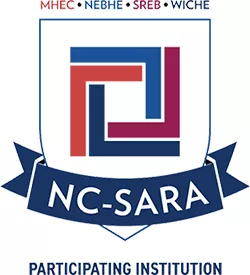Statement on Accreditation
The American College of Financial Services is an accredited institution and a member of the Middle States Commission on Higher Education (MSCHE or the Commission) www.msche.org. The College’s accreditation status is accreditation reaffirmed. The Commission’s most recent action on the institution’s accreditation status on 6/22/23 was to reaffirm accreditation. MSCHE is recognized by the U.S. Secretary of Education to conduct accreditation and pre-accreditation (candidate status) activities for institutions of higher education including distance, correspondence education, and direct assessment programs offered at those institutions. The Commission’s geographic area of accrediting activities is throughout the United States.
For More Information
Middle State Commission on Higher Education
1007 North Orange Street
4th Floor, MB #166
Wilmington, DE 19801
(267) 284-5011
www.msche.org

The American College of Financial Services has been approved to participate in State Authorization Reciprocity Agreements.
The National Council for State Authorization Reciprocity Agreements (NC-SARA) is a private nonprofit organization [501(c)(3)] that helps expand students’ access to educational opportunities and ensure more efficient, consistent, and effective regulation of distance education programs.
Recognizing the growing demand for distance education opportunities, higher education stakeholders – including state regulators and education leaders, accreditors, the U.S. Department of Education, and institutions – joined together in 2013 to establish the State Authorization Reciprocity Agreements (SARA), which streamline regulations around distance education programs.
In partnership with four regional compacts, NC-SARA helps states, institutions, policymakers, and students understand the purpose and benefits of participating in SARA. Today, more than 2,200 institutions in 49 member states, the District of Columbia, Puerto Rico, and the U.S. Virgin Islands all voluntarily participate in SARA.
Why NC-SARA Matters:
- Improves distance education program quality nationwide.
- Makes it easier for students to access distance education programs across state lines.
- Reduces costs and bureaucracy for states and institutions.
- Improves coordination between states on higher education opportunities.
- Provides valuable oversight of distance education programs.
- Shares out-of-state learning experience data like clinical hours and practice teaching.
Professional Licensures and Certifications
The American College of Financial Services is required by the State Authorization Reciprocity Agreement (SARA) and US Department of Education to notify you whether any program meets the academic licensure and certification requirements in another state. The American College of Financial Services does not offer programs that lead to professional licensure as currently defined by PA.
The American College of Financial Services’ programs are designed to meet the requirements of the Pennsylvania Department of Education (PDE) for recommending candidates for any applicable CFP® certifications. The American College of Financial Services CFP® Certification Education Program and Master of Science in Financial Planning (MSFP) are both CFP Board-Registered programs that prepare students to sit for the CFP® exam. Graduates from these programs, who pass the CFP® exam and fulfill the experience and ethics requirements, may call themselves a CFP® professional. There are no individual state certification requirements nor is there state-specific licensing for the CFP® certification.
Prospective students who reside outside of the state of Pennsylvania and who are interested in any of The American College of Financial Services’ academic programs that may lead to professional certification are expected to be aware of the various state professional certification requirements.